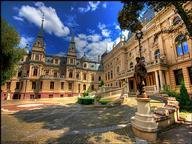Quiz Answer Key and Fun Facts
1. What was the official name of the Polish state created by Napoleon
in 1807?
2. Who was the nominal ruler of this state?
3. The Polish army, newly created in 1807, consisted of three...
4. In February 1807 Napoleon ordered the creation of a Polish cavalry
regiment to be included into the Imperial Guard. What was the original character of this unit?
5. When did Napoleon give the Duchy of Warsaw its constitution?
6. In May 1808 three Polish infantry regiments were detached from the army of the Duchy of Warsaw and sent to fight in which country?
7. Other Polish units active in the Peninsular War were known as the Legion of ....... and ....... Lancers.
8. In the spring of 1809 Austrian forces invaded the Duchy. On 19 April Prince Poniatowski faced the attackers in an inconclusive battle at...
9. Which ancient Polish city with its surrounding area had been annexed
by the Duchy of Warsaw after the victorious campaign of 1809?
10. What was the official governmental title of Prince Joseph Poniatowski, the leader of the Duchy's armed forces?
11. In the spring of 1812, Napoleon's Grande Armee was reorganized in the preparation for the invasion of Russia. Which one of its corps was comprised exclusively of Polish troops?
12. On 5-7 September, 1812, the Grande Armee clashed with the Russians in a great battle at the gates of Moscow. What is the name of this famous encounter in the traditional Polish historiography?
13. During the catastrophic retreat from Moscow, the Grande Armee was saved from the total destruction by the self-sacrificing bravery of military engineers who built, and then rebuilt again and again, the bridges on the icy Beresina river (27-28 November 1812). Who were they?
14. In the spring of 1813, faced with a Russian onslaught, Prince Poniatowski with his freshly reconstituted army decided to:
15. Although the Duchy of Warsaw practically ceased to exist in the spring of 1813, two of its fortresses did not surrender to the Russians until late December. What were they?
Source: Author
ogonczyk
This quiz was reviewed by FunTrivia editor
coolupway before going online.
Any errors found in FunTrivia content are routinely corrected through our feedback system.

